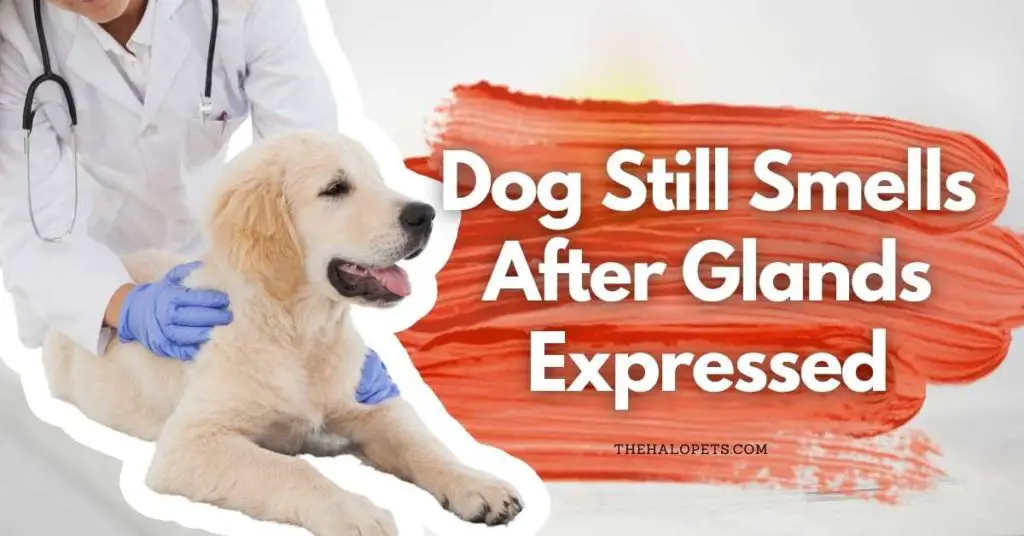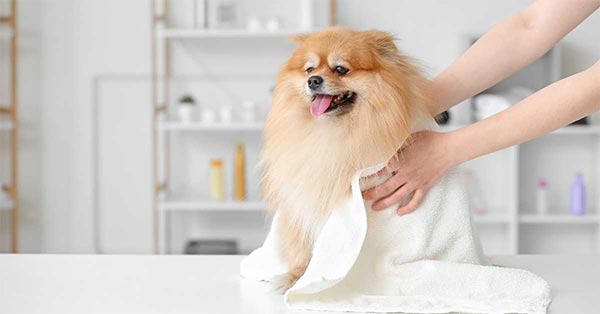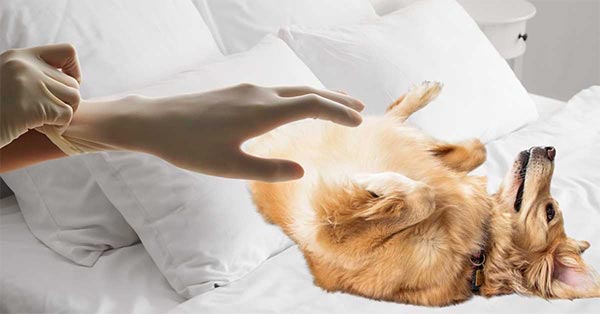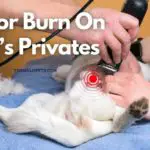
At times, a strong fishy smell comes out of the dog even after the anal glands have been expressed. You can even smell it on your dog’s bed and your furnishings where the dog has been laying. But why does your Dog Still Smells After Glands Expressed? Let us find out!
In this article, we will cover:
- Dog Still Smells After Glands Expressed
- 3 Reasons Why Dog Still Smells After Anal Glands Expressed
- 2 Ways To Get Rid Of Anal Gland Smell?
- And more…
Dog Still Smells After Glands Expressed
Some dogs have a stinky smell after anal gland expression for a few days due to inadequate anal gland expression, anal sac diseases, and quick refilling of fluids in the anal sac. While some of these reasons require vet intervention, others can be treated with high-fiber diet and regular exercise.
Generally, dogs smell for the next 24 hours after expressing their anal sacs. It is because the small amounts of released substance after expression get stuck to the dog’s fur. So, if you have not cleaned or bathed your dog, it is quite natural for it to smell.
However, if you bathed your dog well and cleaned its fur, there could be other reasons why your dog is still smelling after expressing anal glands. You must look into each of these reasons and determine the one affecting your dog.
3 Reasons Why Dog Still Smells After Glands Are Expressed
Let us now see other reasons why your dog is still smelling after anal glands have been expressed:
1. Inadequate Gland Expression

One of the most likely reasons for a dog’s continued odor after anal sac expression is that its glands were never completely empty. This can happen more frequently than you might imagine, due to the pet parent’s negligence if done manually.
Naturally, this happens when your dog’s lifestyle isn’t correct i.e. it is not taking proper nutrition and is lazy. Even if the process had been very recently completed, a badly done job will result in glands that continue to store and discharge the liquid.
Giving your dog a wash and waiting a few days is the best approach to determine whether or not his anal glands were successfully expressed. If the odor lasts longer than a day and continues indefinitely, it means that the entire fluid has not been secreted yet.
2. Refilling Is Quick
Another probable reason for dogs still smelling after the expression of anal glands is that your dog’s anal glands refill quite quickly. Since every dog is different, their anal glands and sacs also work differently.
So, if you notice a stinky smell after a few days of anal gland expression, it might be the case that your dog’s anal glands have started to fill up again. In such dogs, monthly or even weekly anal gland expression is needed to squeeze out all the fluid.
At times, people think that the previous anal gland expression in dogs wasn’t correctly done, that is why the glands are filling up so quickly. However, this is a common misconception.
So, the simple solution to this problem is that anal glands are expressed according to the speed of its refilling whether it is weekly, fortnightly, or monthly. If you find it difficult, the next best option is anal gland removal. However, there are certain risks involved that we have discussed further.
3. Anal Sac Diseases
There are times when a dog’s anal glands are inflamed or impacted. This generally happens due to irregular bowel movements in dogs. As a result, the stools are softer than usual and they are unable to exert the needed pressure on the anal glands. Thus, the fluid gets accumulated in the glands.
As a result, you smell a foul and stinky odor coming out from the back of your dog. According to Dr. Jerry Klein, CVO at the Animal Kennel Club, you can know about anal sac diseases from the following symptoms:
- Scooting over the floor
- Scratching and licking the anal area
- Having difficulty to pass stools
- And blood or pus oozing out from the back
When you notice such symptoms, it is best to consult a veterinarian and get a physical examination done. There might be a case where your dog is suffering from an anal gland abscess or an infection.
How To Get Rid Of Dog Anal Gland Smell? Top 2 Ways
Are you bothered by the fact that your dog still smells after glands expressed? Take a look at the below ways to get rid of the smell.
1. Clean Your Dog’s Gland After They Have Been Expressed

After you have expressed your dog’s anal gland, it is important to wipe your dog’s back to remove any residual fluid sticking to its fur.
For this, you can use dog wipes or a clean soapy washcloth. Make sure you wipe it thoroughly. Once done, spray some grooming spray on your dog’s bum to reduce the stinky and fishy smell.
We would recommend you to use the Earth Rated Dog Wipes for the body, paws, and butt of your dogs. These are plant-based wipes and do not contain any artificial scents. Thus, they are perfect for your dog’s privates, which is a highly sensitive part of its body.
2. Follow An Appropriate Diet For Your Dog
Cleaning your dog’s back is a temporary solution to get rid of the anal gland smell. For a long-term solution, inculcating an adequate high-fiber diet is vital for your dog’s anal gland expression on its own.
A high-fiber diet includes sweet potatoes, pumpkins, beet pulp, lettuce, apples, and green beans. Additionally, feed your dog commercial dog food that is rich in fibers and has digestible proteins.
You can also supplement your dog’s diet with probiotics for good gut health. Our recommendation is the Purina Fortiflora Probiotics for dogs.
In addition to this, make sure your dog drinks plenty of water and goes for exercise regularly. A healthy dog can pass stools easily, thus having no issues with anal gland expression and fluid secretion.
Also Read: A Guide To Getting Your Dog’s Diet Right
How Often Do Dogs Need To Express Their Anal Glands?
Anal Glands expression in dogs varies from one dog to another. It depends on how many times and how fast your dog can empty its glands.
To provide you with a timeline, we would say that most dogs require anal gland expression once or twice a year. However, there can be dogs who require anal gland expression on a monthly basis. These breeds include Chihuahuas, Miniature Poodles, Basset Hounds, Lhasa Apsos, and Cocker Spaniels.
How Do I Express My Dog’s Anal Glands At Home?

Before starting, let us warn you that it is quite a painstaking task. You will be surrounded by foul and unpleasant smells all the time. Still, some pet owners express the anal glands of their dogs to prevent them from infections, abscesses, and impacted and inflamed glands.
Keep some gloves, a pet-safe lubricant, and clean towels handy. We would advise you to take help from one more person to restrain your dog as your dog might feel uncomfortable during the process. Thus, it will tend to move a lot.
Here is how you can express your dog’s anal glands at home. Follow the procedure step-by-step and you will be able to do it.
Step By Step Process:
- Stand your dog on its four legs and then kneel behind it. Ask your partner to engage your dog or restrain it while you start the expression of the anal glands.
- Hold your dog’s tail up and lubricate its anus. Then insert your index finger gently into your dog’s anus.
- Place the thumb of the same hand outside the anus. Now, run your thumb and index finger up and down the anus till you locate the anal glands.
- Generally, the anal glands are grape-sized. Once you get hold of them, gently massage the glands using your thumb and index finger and patiently wait for the fluid to drop. If nothing seems to happen, adjust your position and try again.
- The fluid leaks from the hole present just inside the anus. So, make sure you do not block it with your finger.
- Hold a towel in your other hand in front of the glands as the glands often express themselves with force.
- Check the color of the fluid secreted. If the fluid is thin and brown with a strong odor, it means everything is normal. However, if the fluid is lumpy, green, yellow, or discolored, this is an indication that something is wrong.
- Repeat the same procedure with the other gland as well. Once done, make sure you clean your dog’s back area with soapy water thoroughly to avoid the stinky smell all day.
Expressing the glands is not as easy as it sounds. You might not get it right in the first go itself. But do not be disheartened, consult your veterinarian and ask all the questions you have. They will guide you the next time!
Can My Dog Express Anal Glands On Its Own?
If everything is working fine, dogs should express their anal glands naturally only. According to Dr. Barri J Morrison, DVM at PetMD you only need to express their anal glands manually when your dog does not get a high-fiber diet. It does not maintain its weight and is inactive.
It is because this changes the consistency of your dog’s stool. These stools will thicken the fluid inside the sacs making it harder to express anal glands on their own. When trying hard, dogs’ anal glands can become impacted, infected, and inflamed.
Naturally, whenever a dog has a bowel movement, the feces inside also move. This causes the fluids to empty on their own and anal glands are expressed.
Does Expressing Anal Glands Hurt My Dog?

Normally, the anal glands’ expression isn’t painful. It is why most pet parents choose to do it at home. However, there are times when expressing anal glands can hurt your dogs.
Often, dogs in pain after glands expressed show symptoms like whimpering and scooting on the floor. These symptoms get resolved on their own after a few days.
In rare cases, dogs continue to act like this for longer. It is when you should know that something has gone wrong with anal gland expression in your dog. So, what could have gone wrong?
At times, dogs are unable to express their glands naturally, medical intervention is needed. Vets inject dogs so that the stools can pass easily. The injection site can sting dogs for days.
Moreover, to access the anal area, vets need to shave the privates of their dog. This could lead to razor burns. You can treat razor burns by putting in ointments and home remedies.
Also Read: Coconut oil for dog razor burn? Is It Effective? +7 Benefits & Tips
In addition to this, dogs tend to have infections in their anals after expressing the anal gland. Dr Tammy Hunter, DVM, and Dr. Ernst Ward, DVM at VCA Hospitals explain that secretion within the sacs thickens when the ducts are inflamed. This secretion allows bacteria to grow and travel up in the sacs.
Although these bacteria are flushed when a dog defecates, this does not happen when the glands are swollen and impacted. The fluid does not empty fully causing infection. As a result, the sac is filled with pus leading to an anal sac abscess. Thus, your dog experiences pain when trying to pass stools.
Is Anal Glands Removal A Good Solution For Stinky Smell?
Although there are surgeries for removal of the anal gland, we do not recommend it as it follows uncalled-for complications and risks. The incision required for surgery needs to be checked daily for infection. If you see any abnormal signs like pain, redness, swelling, or white discharge, you will need to contact the vet immediately.
Moreover, some dogs have bowel incontinence after surgeries. According to Dr. Catherine Barnette, DVM at VCA Hospitals, bowel incontinence is a dog’s inability to control feces. In this case, dogs tend to drop their poop anywhere in the house as they are unaware or unable to manage their bowel movements.
Therefore, while trying to solve one problem, you might end up with another in this case. So, go for surgery only if your dog has tumors or infections in the anal glands after taking advice from your vet.
However, if you want to deal with the issue of stinky smell, there are other options available that we have mentioned above.

